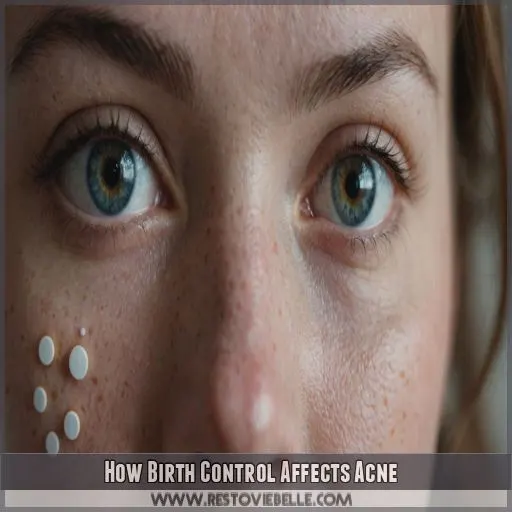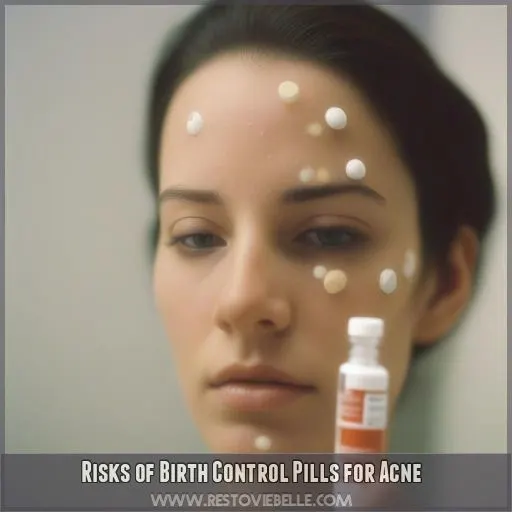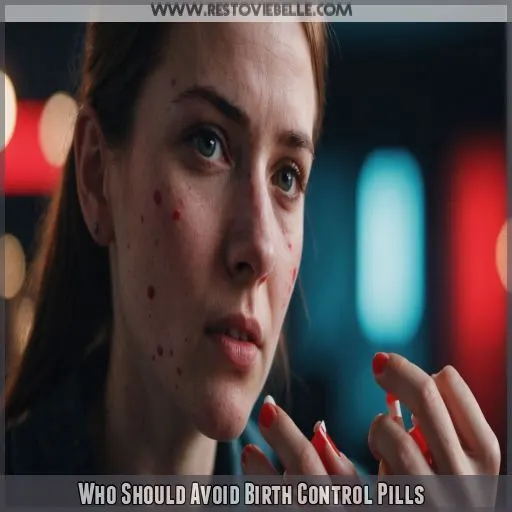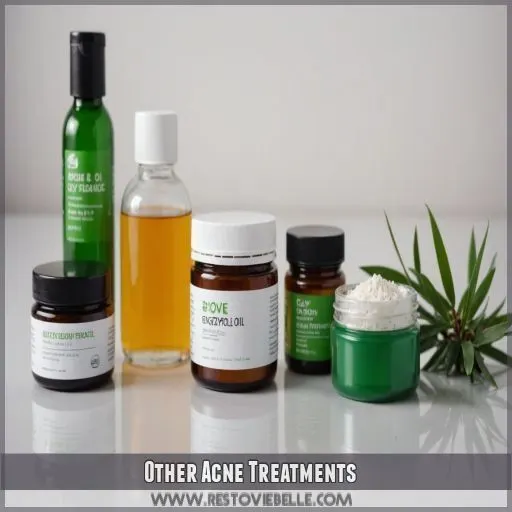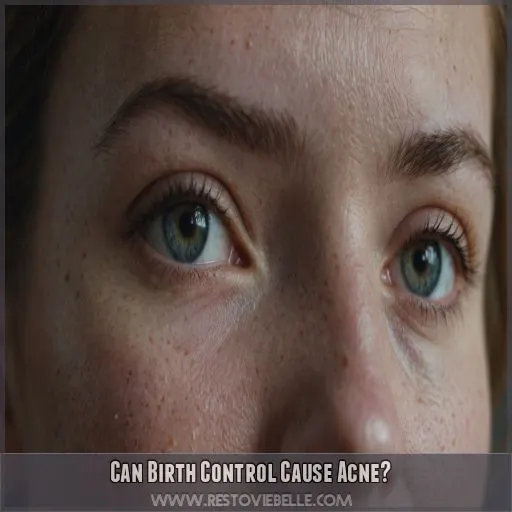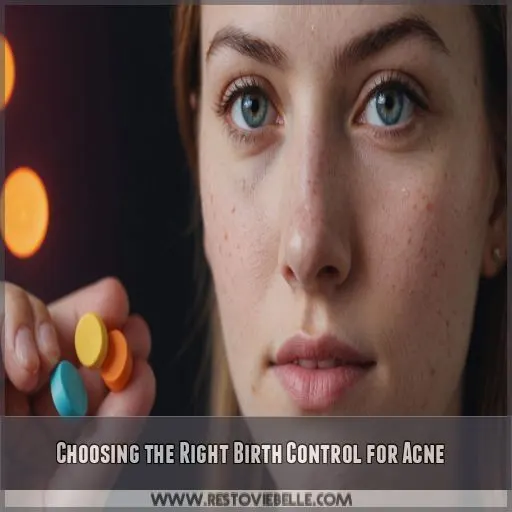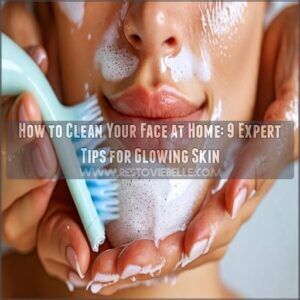This site is supported by our readers. We may earn a commission, at no cost to you, if you purchase through links.
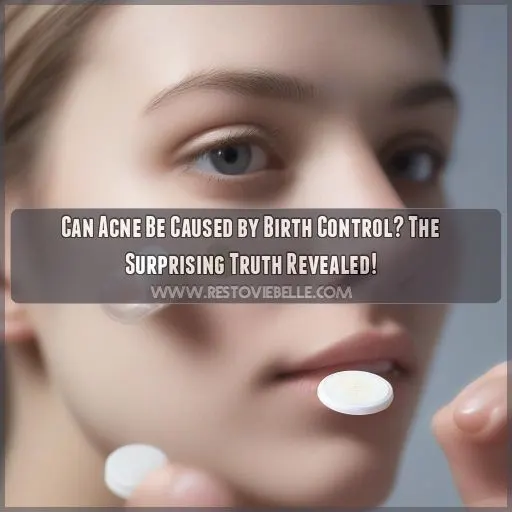 Yes, acne can be caused by birth control, but it’s not all doom and gloom!
Yes, acne can be caused by birth control, but it’s not all doom and gloom!
When you start taking the pill, your hormones might throw a bit of a party, causing some unwanted breakouts.
It’s like your skin’s going through a temporary rebellious phase.
But don’t toss those pills just yet!
Most birth control actually helps clear up acne in the long run.
The key is to give it time—usually about three months—for your body to adjust.
Different types of pills can affect your skin differently, so if you’re still battling blemishes, chat with your doc about finding the right fit.
Table Of Contents
- Key Takeaways
- How Birth Control Affects Acne
- Benefits of Birth Control for Acne
- Risks of Birth Control Pills for Acne
- Who Should Avoid Birth Control Pills
- Other Acne Treatments
- Can Birth Control Cause Acne?
- Choosing the Right Birth Control for Acne
- Frequently Asked Questions (FAQs)
- Which birth control pills cause acne?
- Will birth control acne go away?
- How do you stop hormonal acne from the pill?
- What is hormonal acne triggered by?
- How long does birth control take to clear acne?
- Can switching birth control methods cause acne breakouts?
- Does the copper IUD affect acne differently?
- Are there non-hormonal birth control options for acne-prone skin?
- Can birth control pills worsen existing acne scars?
- Conclusion
Key Takeaways
- Yes, birth control can cause acne initially, but don’t toss those pills just yet! It’s like your skin is going through a temporary rebellious phase. Give it about three months to adjust – your body is just learning a new hormonal dance.
- Different types of birth control affect your skin differently. Some pills, like those with high androgen levels, might make you break out more. However, many others actually help clear up acne in the long run. It’s all about finding your perfect match!
- If you’re struggling with birth control-related acne, you have options. Try tweaking your skincare routine, managing stress, or talking to your doctor about switching pills. Remember, your skin is unique – what works for your best friend might not work for you.
- Birth control isn’t your only acne-fighting superhero. From over-the-counter treatments to lifestyle changes, you have a whole arsenal at your disposal. Think of it as building your own personalized acne-busting team!
How Birth Control Affects Acne
You’re probably wondering if birth control can cause acne, and the answer is a bit more complicated than a simple yes or no. Birth control pills can actually help reduce acne in many women, but in some cases, they can also trigger breakouts or make existing acne worse, so let’s explore how birth control affects acne (Source).
Hormonal Connection to Acne
- Estrogen and progesterone regulate your menstrual cycle
- Hormonal fluctuations can lead to sebum production
- Sebum clogs pores, causing acne
- Stress can disrupt hormonal balance
- Diet can impact hormone levels, too
Androgen Reduction and Acne
Here’s the deal: high androgen levels can trigger acne. Luckily, birth control pills can help reduce these levels, which in turn can reduce acne. By balancing your hormones, you can break free from the cycle of hormonal acne and get clearer skin.
Types of Birth Control Pills for Acne
If you’re thinking about using birth control for acne, the type of pill you choose matters. You have options, but it’s important to understand the differences. Here are some common types:
- Ortho Tri-Cyclen: A popular choice with a specific type of progestin
- Estrostep: Another well-known brand with a slightly different progestin
- YAZ: A low-dose option that’s also used for acne treatment
- Progestin-only pills: These mightn’t be as effective for acne
- Combination pills: These mix estrogen and progestin to regulate hormones
Effectiveness of Birth Control for Acne
For acne-prone skin, birth control pills can be a real game-changer. Here’s a snapshot of what you can expect:
| Birth Control Type | Acne Severity | Success Rate |
|---|---|---|
| Ortho Tri-Cyclen | Moderate | 50-60% |
| Estrostep | Mild-Moderate | 40-50% |
| YAZ | Moderate-Severe | 60-70% |
These numbers are promising, but remember, everyone’s skin is different.
Benefits of Birth Control for Acne
You’re probably wondering if birth control is a viable solution for your acne, and the answer is yes – it can be an effective way to tackle those pesky breakouts while also providing contraception.
Contraception and Acne Treatment
- 99% effective contraception
- Acne treatment for hormonal breakouts
- Regulated periods for a stress-free life
- Lower hormone levels for a healthier you
Menstrual Regulation and Acne
Here’s the surprising part: birth control pills can help regulate your menstrual cycle, leading to shorter, lighter periods and less painful cramps – a total win! This, in turn, can reduce hormonal acne and period acne, giving you clearer skin and more freedom.
Other Benefits of Birth Control for Acne
In addition to acne relief, you may experience other benefits from birth control pills, including:
- Lighter periods: Reduced cramping and lighter flows make life easier.
- Regular cycles: Your body gets into a predictable rhythm, giving you more control.
- Improved mood: Fewer PMS symptoms and reduced mood swings mean a happier you!
Lower Hormone Levels in Modern Birth Control
Here’s the good news: modern birth control pills contain lower hormone levels, reducing the risk of certain health problems. You’ll still get the benefits of clear skin, regulated periods, and effective contraception, but with fewer potential side effects.
Risks of Birth Control Pills for Acne
You’re probably thinking, "Wait, isn’t birth control supposed to help with acne, not cause it?" But, like with any medication, birth control pills come with some potential risks and side effects, including some that can affect your skin.
Common Side Effects of Birth Control Pills
When taking birth control pills for acne, you may experience some common side effects. These can be annoying, but they usually aren’t serious. Here are a few to watch out for:
- Breakthrough bleeding
- Mood swings
- Breast tenderness
- Headaches
Increased Risk of Heart Attack and Stroke
When taking birth control pills for acne, you need to be aware of the increased risk of heart attack and stroke, especially if you’re a smoker or have pre-existing heart conditions. Be honest with your doctor about your medical history to minimize risks.
Blood Clots and Birth Control Pills
Now, let’s talk about blood clots. Taking birth control pills can increase your risk of developing blood clots in your lungs or legs. Be aware of these risk factors:
- Smoking
- Obesity
- Family history of blood clots
- Prolonged immobility
High Blood Pressure and Birth Control Pills
When taking birth control pills, you should keep an eye on your blood pressure. Some women might see their blood pressure go up, which can lead to heart problems.
| Blood Pressure Levels | Risks | Actions |
|---|---|---|
| Normal (120/80) | Low risk | Continue monitoring |
| Elevated (120-129/80) | Moderate risk | Lifestyle changes |
| Stage 1 (130-139/80-89) | High risk | Medication alternatives |
| Stage 2 (140+/90+) | Very high risk | Doctor consultation |
| Crisis (180+/120+) | Emergency | Seek immediate help |
Who Should Avoid Birth Control Pills
If you’re considering birth control pills for acne, you need to know if they’re a good fit for you – and that includes understanding who should avoid them altogether. Certain individuals, such as smokers over 30, pregnant or breastfeeding women, those with obesity, and people with a history of heart disease, should avoid birth control pills because of increased health risks.
Smokers Over 30 and Birth Control
If you’re a smoker over 30, birth control pills mightn’t be the best choice. You’re already at a higher risk for heart disease and stroke, and birth control can increase that risk. Consider these alternatives:
- Quit smoking: It’s tough, but it’s worth it for your overall health.
- Non-hormonal birth control: Explore options like copper IUDs or barrier methods.
- Lower-risk birth control: Talk to your doctor about lower-risk pills or patches.
- Alternative acne treatments: Consult a dermatologist about oral medications or skin care routines.
Pregnancy and Breastfeeding With Birth Control
If you’re pregnant or breastfeeding, birth control pills are a no-go. Hormonal changes during pregnancy can actually improve acne, but certain birth control methods can pose risks to your baby. Discuss safe alternatives with your doctor to prioritize your health and your little one’s.
Obesity and Birth Control Pills
If you’re on birth control pills and you’re concerned about your weight, there are things to keep in mind. Your weight can affect how well the pill works and increase the risk of:
- Blood clots
- Medication interaction
- Hormonal changes
- Reduced effectiveness in treating acne and hirsutism
Heart Disease and Birth Control Pills
If you have heart disease or high blood pressure, birth control pills may not be the best choice.
Other Acne Treatments
If you’re struggling with acne, you’re not alone – and you’re not limited to just birth control as a solution. From over-the-counter cleansers to prescription treatments and lifestyle changes, there are many other ways to tackle acne and find the clear skin you’ve been searching for.
Over-the-Counter Treatments for Acne
If you’re not ready for prescription-strength treatments, over-the-counter (OTC) options can be a great starting point. Look for products containing salicylic acid or benzoyl peroxide, which help unclog pores and reduce inflammation. Some popular OTC acne products include cleansers, spot treatments, and moisturizers.
Prescription Treatments for Acne
If over-the-counter treatments aren’t enough, your doctor may prescribe stronger medications. Consider the following options:
- Topical retinoids to prevent clogged pores.
- Oral antibiotics to reduce bacteria and inflammation.
- Isotretinoin for severe acne.
- Laser therapy or chemical peels for scars and hyperpigmentation.
Lifestyle Changes for Acne Management
Making lifestyle changes can be a game-changer for acne management. By maintaining a balanced diet, reducing stress, getting enough sleep, and exercising regularly, you can help regulate your skin. Don’t forget to stick to a consistent skincare routine to keep those sebaceous filaments in check!
Professional Treatments for Acne
- Chemical peels to exfoliate and unclog pores
- Microdermabrasion to smooth out your skin
- Laser therapy to target acne-causing bacteria
- Extractions to remove stubborn pimples
Can Birth Control Cause Acne?
You’re probably thinking that birth control is supposed to help with acne, not cause it – and you’re right, it often does. However, in some cases, birth control can actually trigger or worsen acne, especially if you’re using the wrong type or have a specific hormonal imbalance.
How Birth Control Can Trigger Acne
When you start birth control, your body may freak out, triggering acne. This is due to hormonal changes, particularly androgen surges. Your skin may take time to adjust, leading to breakouts, especially if you’re prone to hormonal acne.
Types of Birth Control That Can Cause Acne
If you’re looking for birth control, you might want to watch out for a few types that can cause acne. Here are three to keep in mind:
- High-androgen pills: These contain progestins like levonorgestrel or norgestrel, which can stimulate oil production and lead to breakouts.
- Progesterone-only pills: These can also cause hormonal imbalances that lead to acne.
- High-estrogen pills: While estrogen can help with acne, high doses can have the opposite effect and trigger skin reactions.
How to Stop Hormonal Acne From Birth Control
If you’re battling hormonal acne caused by birth control, don’t throw in the towel just yet! You’ve got options. Try tweaking your skincare routine, managing stress, and watching your diet. Sometimes, a little patience goes a long way – your skin might just need time to adjust.
What to Do if Birth Control Causes Acne
If birth control’s causing acne, don’t panic! You’ve got options:
- Switch to a different pill
- Try topical acne treatments
- Talk to your doctor about alternatives
- Make lifestyle changes
Choosing the Right Birth Control for Acne
Choosing the right birth control for acne can be tricky, but it’s really important for your skin and overall health. You’ll need to weigh several factors and work closely with your doctor to find the perfect fit for you.
Factors to Consider When Choosing Birth Control
When choosing birth control for acne, it’s not one-size-fits-all. Think of it like shopping for the perfect pair of jeans – you’ve got to think about several factors. Here’s a quick rundown:
| Factor | Why It Matters |
|---|---|
| Lifestyle | Fits your daily routine |
| Side Effects | Minimal impact on your well-being |
| Cost | Fits your budget |
| Effectiveness | Tackles both acne and contraception |
Monitoring Symptoms and Adjusting Birth Control
When you’re on birth control for acne, keep a close eye on your skin’s reaction.
If you’re experiencing acne flare-ups or breakthrough bleeding, don’t panic!
It’s like your body’s learning a new dance.
Give your new pill a fair trial, typically three months.
Track spotting patterns and any side effects.
Consulting a Doctor for Birth Control Advice
Birth control and acne can be a tricky combo, but your doctor’s got your back. They’ll help you figure out the best options for you, considering what’s important to you. Here’s what you can expect:
- A chat about your medical history
- An honest talk about your skin goals
- A look at possible side effects
- A plan to track your progress
Frequently Asked Questions (FAQs)
Which birth control pills cause acne?
Whoa, Nelly! Most birth control pills actually help with acne. But some progestin-only pills, like the "mini-pill," might cause breakouts. You’ll want to chat with your doctor about finding the right pill for your skin.
Will birth control acne go away?
Yes, birth control acne usually clears up. It might take a few months, but hang in there! Your skin’s adjusting to the hormonal changes. If it’s still bugging you after 3-4 months, chat with your doc about options.
How do you stop hormonal acne from the pill?
You’re not alone in this skin battle! To tackle hormonal acne from the pill, try using gentle cleansers, applying topical treatments, and giving your skin time to adjust. Remember, patience is key – results may take a few months.
What is hormonal acne triggered by?
Your hormones are like puppeteers, pulling strings that can trigger acne. Fluctuations in androgens, especially during your period, stress, or puberty, can lead to excess oil production. It’s like your skin’s own little hormone drama!
How long does birth control take to clear acne?
Time flies when you’re waiting for clear skin! You’ll typically need to give birth control 3-6 months to work its magic on acne. Be patient and consistent – results don’t happen overnight, but they’re worth the wait.
Can switching birth control methods cause acne breakouts?
Yes, switching birth control can trigger acne breakouts. Your body’s adjusting to new hormone levels, which might upset your skin’s balance. Don’t panic though – it’s usually temporary. Give your skin time to adapt, and consult your doctor if needed.
Does the copper IUD affect acne differently?
Unlike hormonal birth control, the copper IUD doesn’t affect your hormones. It won’t directly improve or worsen acne. However, if you’re switching from hormonal methods, you might notice changes in your skin as your body adjusts.
Are there non-hormonal birth control options for acne-prone skin?
Good news: there are non-hormonal options for acne-prone skin. You’ve got choices like copper IUDs, barrier methods, and natural family planning. These won’t affect your hormones, potentially keeping your skin clear while preventing pregnancy.
Can birth control pills worsen existing acne scars?
Birth control pills won’t worsen existing acne scars, but they might affect your skin’s overall appearance. While they can help control active breakouts, they’re not a magic eraser for old scars. Talk to your dermatologist about targeted scar treatments.
Conclusion
Battling blemishes? Birth control can be both a blessing and a bother.
While it’s true that acne can be caused by birth control initially, most pills actually improve skin over time.
If pesky pimples persist, don’t panic! Talk to your doctor about finding the right formula for you.
With patience and the proper pill, you can potentially enjoy clearer skin and effective contraception.

